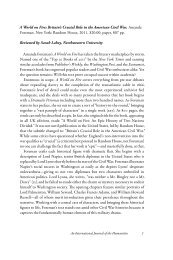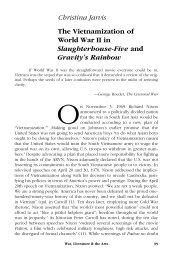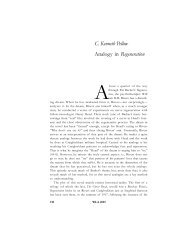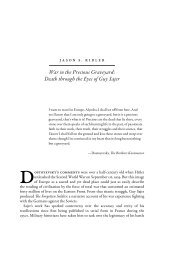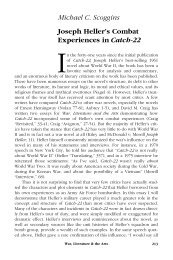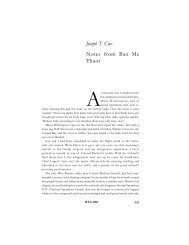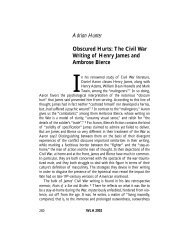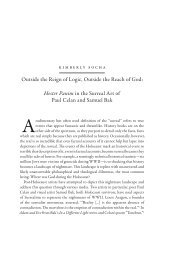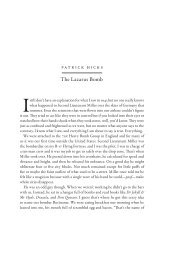Conrad's “The Secret Sharer”: A Private Ethics of Leadership
Conrad's “The Secret Sharer”: A Private Ethics of Leadership
Conrad's “The Secret Sharer”: A Private Ethics of Leadership
You also want an ePaper? Increase the reach of your titles
YUMPU automatically turns print PDFs into web optimized ePapers that Google loves.
mood <strong>of</strong> secrecy had penetrated my very soul” (32-33). The comforting script with<br />
which he started his narrative is gone, and with it the weaknesses <strong>of</strong> self-doubt. The<br />
narrator is creating a metasystem, represented for a time by Leggatt–his firmness,<br />
resolution, and self-trust–but ultimately to be converted by the narrator’s own<br />
courage into a tested foundation <strong>of</strong> leadership.<br />
This resolution is fixed by the narrator’s desire to see his secret sharer safely <strong>of</strong>f<br />
the ship. In order to let Leggatt swim to shore he approaches an island called Kohring<br />
and sails under the face <strong>of</strong> its massive cliff. “It was now a matter <strong>of</strong> conscience<br />
to shave the land as close as possible–for now he must go overboard whenever the<br />
ship was put in stays.” But the narrator-captain takes his ship in much closer than<br />
is necessary, especially given Leggatt’s prize-winning swimming power <strong>of</strong> which<br />
much is made when he first comes on board. The closeness to the land is a gift that<br />
Leggatt does not need. The narrator also presses on his double some money and a<br />
floppy white hat to protect his head from the tropical sun. The reader knows that<br />
these gifts are not so much to Leggatt the exile as they are necessary to the narrator<br />
as he parts with his double, a kind <strong>of</strong> acknowledgment <strong>of</strong> the legacy <strong>of</strong> leadership<br />
that Leggatt will leave behind. In sailing in so close, putatively looking for a land<br />
wind, the narrator captain risks his own life, the lives <strong>of</strong> his men, above all the ship<br />
itself. He risks them all for no practical purpose, for no publicly defensible reason.<br />
No jury would acquit him <strong>of</strong> his rashness. As the ship moves in close the chief<br />
mate cracks under the strain and the narrator subdues him, subdues him without<br />
harming him. He thinks <strong>of</strong> Leggatt, “perhaps he was able to understand why, on<br />
my conscience, it had to be thus close–no less” (42,44). What does he mean, “on my<br />
conscience?” To whom does he owe the indefensible risk he chooses to take? The<br />
reader must provide an answer to this question and the only answer that remains is<br />
that he owes the gesture to himself.<br />
What is strangest in all this may not be the narrator’s self-referential choice, but<br />
the fact that readers rejoice in it. We rejoice in the thrilling gesture at the end.<br />
Why? Because we intuit that something more important than responsible, efficient<br />
management is going on. And something more important even than British justice,<br />
than trial by jury. We the readers are the privileged “witnesses” and “judges” who<br />
haunted the narrator at the beginning <strong>of</strong> his command. We see in the impractical<br />
and dangerous virtuosity something even more important than the safety <strong>of</strong> the<br />
ship: the achievement <strong>of</strong> a truly creative authority.<br />
At the crucial last moment the narrator tries to determine the direction <strong>of</strong> the<br />
unfamiliar ship in the calm sea. He looks desperately for a sign, for a marker that<br />
will give him the knowledge that will save them all. Suddenly he spots his own white<br />
x War, Literature & the Arts



